
Beau Travail is a 1999 French film directed by Claire Denis that is based on Herman Melville's 1888 novella Billy Budd. The story is set in Djibouti, where the protagonists are soldiers in the French Foreign Legion. Parts of the soundtrack of the movie are from Benjamin Britten's 1951 opera based on the novella.

Jean Marie Maurice Schérer or Maurice Henri Joseph Schérer, known as Éric Rohmer, was a French film director, film critic, journalist, novelist, screenwriter, and teacher.
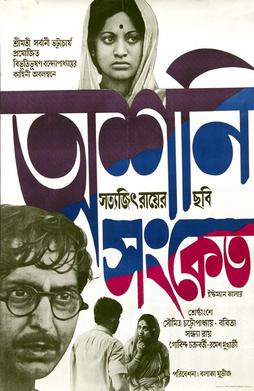
Distant Thunder is a 1973 Bengali film by the Indian director Satyajit Ray, based on the novel by the same name by Bibhutibhushan Bandopadhyay. Unlike most of Ray's earlier films, Distant Thunder was filmed in colour. It stars Soumitra Chatterjee, who headlined numerous Ray films, and the Bangladeshi actress Bobita in her only prominent international role. Today the film features in The New York Times Guide to the Best 1,000 Movies Ever Made. It marked the debut of the theatre star Mrityunjay Sil.
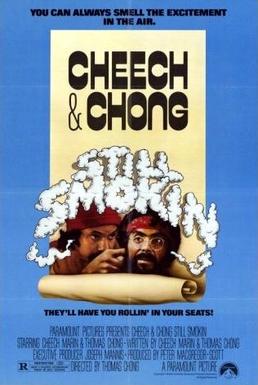
Still Smokin is a 1983 American comedy film directed by Tommy Chong, featuring Cheech & Chong sketches with a wraparound story involving the duo arriving in Amsterdam for a film festival. While the film grossed $15 million, it received predominantly negative reviews.

Bill Cosby: Himself is a 1983 comedy film featuring American stand-up comedian Bill Cosby. Filmed before a live audience at Hamilton Place in Hamilton, Ontario in 1981, Cosby gives the audience his views ranging from marriage to parenthood. The film also showcases Cosby's conversational style of stand-up comedy. For most of the performance, Cosby is seated center-stage, only getting up to emphasize a joke.

The Last Remake of Beau Geste is a 1977 British historical comedy film directed, co-written and starring Marty Feldman. It is a satire loosely based on the 1924 novel Beau Geste, a frequently-filmed story of brothers and their adventures in the French Foreign Legion. The humor is based heavily upon wordplay and absurdity. Feldman plays Digby Geste, the awkward and clumsy "identical twin" brother of Michael York's Beau, the dignified, aristocratic swashbuckler.
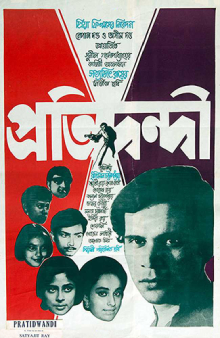
Pratidwandi is a 1970 Indian Bengali drama film written and directed by Satyajit Ray based on the novel by Sunil Gangopadhyay. It is the first part of the Calcutta trilogy. Pratidwandi tells the story of Siddharta, an educated middle-class man caught up in the turmoil of social unrest. Corruption and unemployment are rampant, and Siddhartha cannot align himself with either his revolutionary activist brother or his career-oriented sister. The film is known for experimenting with techniques such as photo-negative flashbacks.
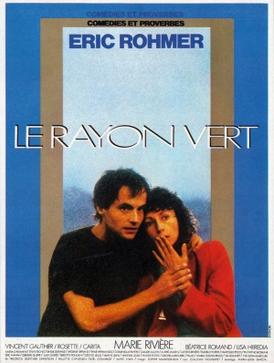
The Green Ray, released in North America as Summer, is a 1986 French romantic drama film written and directed by Éric Rohmer. It is the fifth instalment in Rohmer's "Comedies and Proverbs" series. The film was inspired by the novel of the same name by Jules Verne. It was shot in France on 16 mm film and much of the dialogue is improvised. The film won the Golden Lion and the FIPRESCI Prize at the 43rd Venice International Film Festival.

Claire's Knee is a 1970 French romantic drama film written and directed by Éric Rohmer. It follows a soon-to-be-married man and his conflicted relationship with two teenage girls. The film stars Jean-Claude Brialy, Aurora Cornu, Béatrice Romand and Laurence de Monaghan. It is the fifth film in the series of the Six Moral Tales (1963–1972).
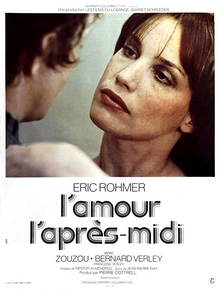
Love in the Afternoon is a 1972 French romantic comedy-drama film written and directed by Éric Rohmer. It is the sixth and final installment in Rohmer's Six Moral Tales series.

The Aviator's Wife is a 1981 French romantic comedy-drama film written and directed by Éric Rohmer. The film stars Philippe Marlaud, Marie Rivière and Anne-Laure Meury. Like many of Rohmer's films, it deals with the ever-evolving love lives of a group of young Parisians.
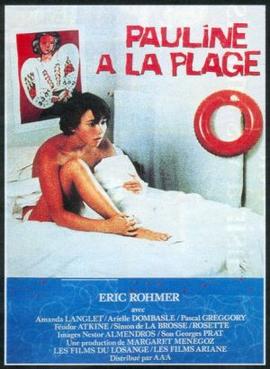
Pauline at the Beach is a 1983 French romantic comedy film directed by Éric Rohmer. The film stars Amanda Langlet, Arielle Dombasle, Pascal Greggory and Féodor Atkine. It is the third in the 1980s series "Comedies and Proverbs" by Rohmer.
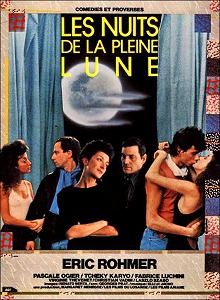
Full Moon in Paris is a 1984 French romantic comedy-drama film written and directed by Éric Rohmer. The film stars Pascale Ogier, Tchéky Karyo and Fabrice Luchini. The score is by Elli et Jacno.

Boyfriends and Girlfriends is a 1987 French romantic comedy-drama film written and directed by Éric Rohmer. The film stars Emmanuelle Chaulet, Sophie Renoir, Anne-Laure Meury, François-Éric Gendron and Éric Viellard. It is the sixth and final instalment in Rohmer's Comedies and Proverbs series. The title literally means the (male) friend of my (female) friend, or perhaps the boyfriend of my girlfriend: it echoes the proverb "Les amis de mes amis sont mes amis".

The Romance of Astrea and Celadon is a 2007 historical romantic comedy-drama film written and directed by Éric Rohmer and starring Andy Gillet and Stéphanie Crayencour. Based on Honoré d'Urfé's 17th-century novel L'Astrée, it is the final feature film directed by Rohmer. It was released in France on 5 September 2007.
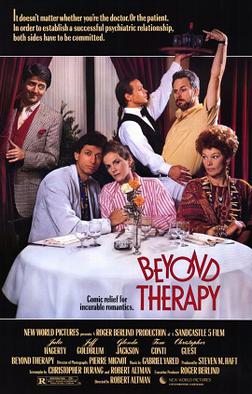
Beyond Therapy is a 1987 American comedy film written and directed by Robert Altman, based on the 1981 play of the same name by Christopher Durang. It stars Julie Hagerty, Jeff Goldblum, Glenda Jackson, Tom Conti, and Christopher Guest.
Virginie Thévenet is a French actress, director and screenwriter.

Gaily, Gaily is a 1969 American comedy film directed by Norman Jewison. It is a fictionalized adaptation of a 1963 memoir of the same name by Ben Hecht and stars Beau Bridges, Brian Keith, George Kennedy, Hume Cronyn and Melina Mercouri.

Plaza Suite is a 1971 American comedy film directed by Arthur Hiller. The screenplay by Neil Simon is based on his 1968 play of the same title. The film stars Walter Matthau, Maureen Stapleton, Barbara Harris and Lee Grant.

Pleasure Party is a 1975 French film directed by Claude Chabrol and starring its screenwriter and longtime Chabrol collaborator Paul Gégauff. In the film, Gégauff plays a writer with a troubled marriage that ends in tragedy. His wife is played by his real-life first wife Danièle Gégauff and his daughter is played by real-life daughter Clemence Gégauff.


















